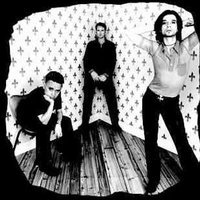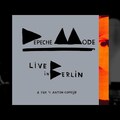There’s this insistent synth bleating running through “Soft Touch/Raw Nerve” that’s so stiff and dopey (and is surely played with one finger) that it puts a smile on my face. That’s because that awkward and quite unsexy line reminds of Depeche Mode’s very earliest output, back when the group was four fresh-faced suburban teenagers playing dinky melodies on their cumbersome ‘80s keyboards. As dated as some of those vintage Depeche tracks are now, they still evidence the naïve charm—an unease and unsteadiness inherent to adolescence—that allowed the band to conquer the hearts of millions of love-struck teens back when.
The three remaining members of Depeche Mode haven’t been boys for a long time, though. They have aged into the cool, somber elder statesmen of synthpop, with enough records sold and musical disciples cultivated over their three-decade existence to ensure their legacy. At this point, it’s arguable that there ever needs to be another Depeche Mode album. However, singer Dave Gahan, songwriter Martin Gore, and “that other bloke” Andrew Fletcher aren’t ready for the pop music retirement home just yet, and as a result Delta Machine is upon us, a fairly solid Depeche Mode LP with an air of finality about it.
It could just be me. Part of it is the admittedly flimsy symbolism of the album name and the trio itself sharing the same initials. Then there’s the fact that the last song on the record is titled “Goodbye”. But more of an influence upon me is the ominous solemnity that makes up much of Delta Machine’s runtime. Ok, this is a Depeche Mode LP—this is an act that’s no stranger to issuing punishing slabs of introspective bleakness for its loyal fanbase to gobble up. Delta Machine is assuredly another such slab, its slow electro-blues dirges drenched in the familiar Depeche themes of lust and guilt.
If I make it sound like Delta Machine is no fun to listen to, well, no one really listens to Depeche Mode post-Black Celebration for the jollies, let’s be honest. Yet the new record isn’t a chore to grapple with, either. The mournful brooding does persist for a long time, and Depeche Mode hasn’t been in the habit of offering up home-run pop singles since Alan Wilder left in the mid-‘90s (when they do arrive, like “Precious” did in 2005, their absence is all the more glaring), so don’t go in expecting another “People Are People” or “Enjoy the Silence”. However, the band does have means to compensate for the lack of melodic immediacy: Martin Gore illustrates that he’s a master of subtle shading in the way he manipulates his modular synths (he’s no Alan Wilder, though), and Dave Gahan, warm-voiced and seductive as always, turns in some downright amazing performances. On “Angel”, Gahan particularly relishes his turn at the mic, delivering Gore’s words like some lecherous preacher.
It’s in its second half where Delta Machine lets a few varying shades slip in to break up the sea of black. There’s a bold, club-ready shuffle to “Soothe My Soul”, a song that seems to have had more effort expended upon it that anything else on the record. Odd that it’s not a single… yet. “Alone” moves at fast enough to propel listeners along without being out of pace with its album mates. The pointedly-titled “Goodbye” is less glum than the name would suggest; it’s a number in the “Personal Jesus” electric blues mode, with Gahan center stage as a sun-beaten, hard-lived cowboy. When he sings “Goodbye again”, the music rouses, and it’s clear that Depeche Mode is intent on inciting a standing ovation once the music ends.
As is becoming common practice these days, there’s also a deluxe edition of Delta Machine available that adds four more tracks after “Goodbye”. Aside from somewhat spoiling the album’s carefully-considered curtain call, the bonus tracks don’t add or detract from the proper LP, instead being more variations on the established themes and sounds (for the curious and/or completist, do note that “Always” stands out more than the others due to its use of electronic tones that could come straight out of an eight-bit video game and Martin Gore’s borrowing a hook from “I Feel Love”). Delta Machine is best taken as that 13-song slab, one that is a near-perfect summation of the band those skinny teenagers who regularly showed up on children’s mornings programs have grown up into. If my gut is right and this is to be the final signal from Depeche Mode after all, it’s a fitting conclusion. If it isn’t, I can’t see the need for anything more to be said beyond it, to be honest, unless Martin Gore’s been holding out with one last stunner of a single.
10/7





